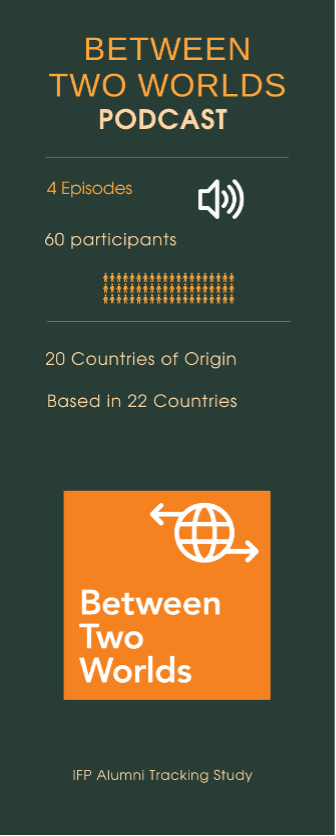Greetings, fellow evaluators! My name is Nora Nemeth, and I am a member of the Research, Evaluation, and Learning Team at the Institute of International Education (IIE). I am based out of the Budapest, Hungary office.
One of the most inspiring aspects of my work is having the opportunity to directly hear from grantees of international scholarships and fellowships and learn about their trajectories and their impact on their communities. In collaboration with my colleagues Mirka Martel and Bridget Barry, we produced a podcast to present findings for a qualitative study within the Ford Foundation International Fellowships Program IFP Alumni Tracking Study. Through the study, we seek to study the effect that higher education can have on marginalized populations to better understand the long-term impact of international higher education scholarship programs that seek to promote social change.
This was the first time our team produced a podcast, to complement our series of reports and issue briefs. The primary objective was to reach a wider audience beyond key stakeholders who read our publications on the 4,305 alumni from 22 countries. Through Between Two Worlds, we share the stories and the voices of program alumni: social justice leaders living around the world.
Here I will provide highlights about the process of producing a podcast in evaluation, including the benefits, challenges, and recommendations. Data collection involved hosting virtual focus groups and individual interviews. Segments of the original recordings of our interviews can be heard in the episodes. It almost feels like sitting in the same room with these remarkable individuals. Who better to share their experiences, than the Alumni themselves?
Lessons Learned:
The top challenge was ensuring strong audio quality for the interviewees for whom internet connectivity varied as participants were globally dispersed. An ideal scenario would be to conduct interviews in a studio setting. If that is not possible, the next-best scenario is for participants to secure high-speed internet and minimal interruptions from others, with little to no background noise. This was not always feasible as most people worked from home during COVID and some of the clips were unfortunately unusable as the quality was not sufficient.
Creating a podcast to present evaluation data may take significantly longer than a written evaluation report. Here are recommendations for the process:
Hot Tip#1: Write for the spoken word. Sentences should be short and easily spoken; also, the narrator needs to emphasize key points clearly and reinforce themes. Key takeaways are clearly stated.
Hot Tip#2: Invest in the appropriate sound equipment for podcasting. A high-quality USB microphone with a built-in pop-filter or one with an external pop-filter will do. You can also try speaking at an angle. Doing so will help to avoid the pops and plosives. Use headphones.
Hot Tip#3: Record sessions with two or more co-hosts via Zoom or alternatives. Another possibility is Zencastr, designed specifically for recording multiple speakers for podcasts virtually. Through recording separate audio tracks locally this can maintain your audio quality if you experience internet issues during the recording, and can streamline the editing process.
Hot Tip #4: Work with an expert or podcast studio to assist with editing your recordings and help finalize each episode. Multiple rounds of edits are necessary before and after initial versions of episodes are produced. Audio should be edited for clarity with written consent from the interviewees to identify them and include their voices.
Hot Tip #5: Share the podcast via social media channels and add to various podcast platforms. Using platforms such as podbean.com or anchor.fm will allow you to distribute your episodes to multiple platforms and apps. Askcontacts to share on their channels and promote on their podcasts.

Do you have questions, concerns, kudos, or content to extend this aea365 contribution? Please add them in the comments section for this post on the aea365 webpage so that we may enrich our community of practice. Would you like to submit an aea365 Tip? Please send a note of interest to aea365@eval.org. aea365 is sponsored by the American Evaluation Association and provides a Tip-a-Day by and for evaluators. The views and opinions expressed on the AEA365 blog are solely those of the original authors and other contributors. These views and opinions do not necessarily represent those of the American Evaluation Association, and/or any/all contributors to this site.
